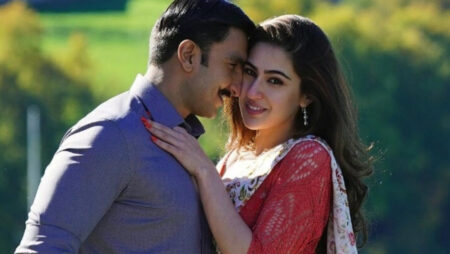Thalaivii is an upcoming Indian multilingual biographical film based on the life of J. Jayalalithaa, a politician and cinema actress. She spent six years as the Chief Minister of Tamil Nadu, starring Kangana Ranaut.
The film follows actor-turned-politician Jayalalithaa (Kangana Ranaut), her friendship with the renowned M. G. Ramachandran (Arvind Swamy), and her turbulent ascent to prominence as Tamil Nadu’s former chief minister.
Most people are familiar with Jayalalithaa’s political path as an iconic figure in Indian politics. Director Vijay tries to break through her icy, frigid exterior and see her as a woman driven by love. Make no doubt about it.
The storey revolves around a woman’s struggle for self-respect and her fight against patriarchy. Her unconditional love for MGR, though, is at the heart of the storey. Even as murky politics, power struggles, and people tried everything to separate them, their love remained pure. There is a strong link between the two of them.
The instances in which the two engage in quiet phone calls with no words exchanged but hearts expressing loudly enough to convey their sentiments are devastating. Vijay gets the love storey right, and it’s the central theme of his film.
Kangana Ranaut, who plays the titular character, taps her inner rebel to make a point: she is not second best. In a way, her screen role imitates her real life in this scenario. She gives a strong performance as a lovelorn woman who continues rising from the ashes like a Phoenix. With quiet resolve and a commanding presence, she lifts the straightforward but predictable narrative.
She doesn’t precisely imitate Jaya, but she nails the tone and intricacies of her persona. MGR, Kangana’s mentor and love, is the wind beneath her wings, and Arvind Swamy as MGR is the perfect companion. He offers a sense of serenity to the raging storm that has engulfed Jaya. Swamy’s demeanour and body language are excellent.
While the film’s second half is filled with many “dialoguebaazi” and slowmo walks, the film’s most substantial aspect is its heartbreakingly sad love tale. The males don’t like it when a former film wali heroine rises to power, which is presented in a repetitious and theatrical fashion. Another concern is shoddy editing and a loud background score.
Dialogues are meticulously composed and strike the proper chord. Jaya’s life is best summed up by the phrase “Mahabharat ki dusra naam jaya hai.” “Bina Matlab ke log bhagwaan ko bhi yaad nahi karte,” her mother rightly argues in a scene where Jaya tells her ill mother that people only remember you when they need you.
“Krishna ko sab pasand karte the, phir bhi Radha ki sab mein ginti nahi hoti,” Jaya responds when told that everyone admires MGR and that she is no exception. The outfits of Neeta Lulla are intricate and compelling.
The reconstruction of a bygone age is done effectively, from Conical bras of the 1960s and 1970s to winged eye makeup and props.
Thailaivii pays a heartfelt tribute to Jaya-heartfelt MGR’s love tale. The political segment is respectful and lacking in objectivity.












